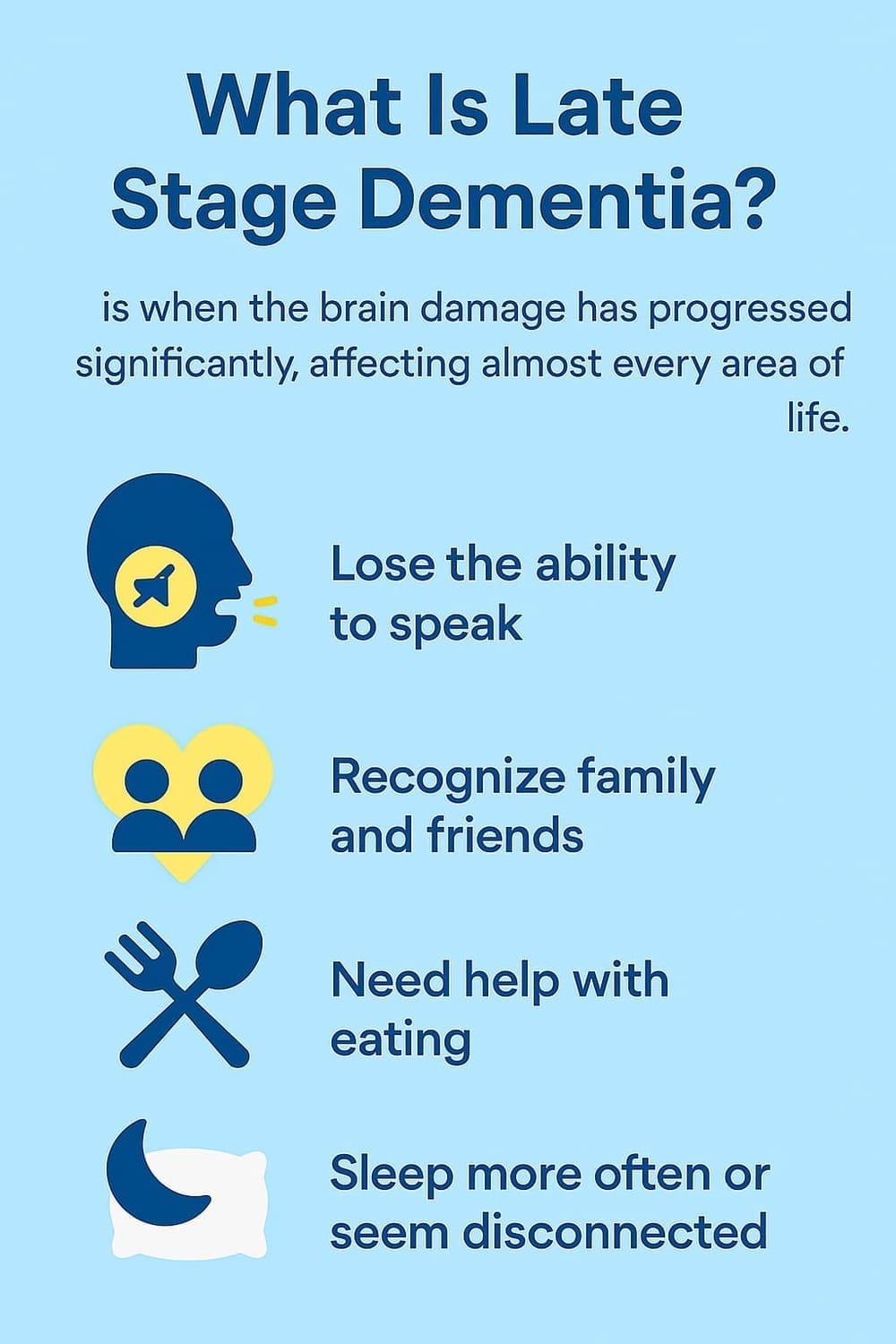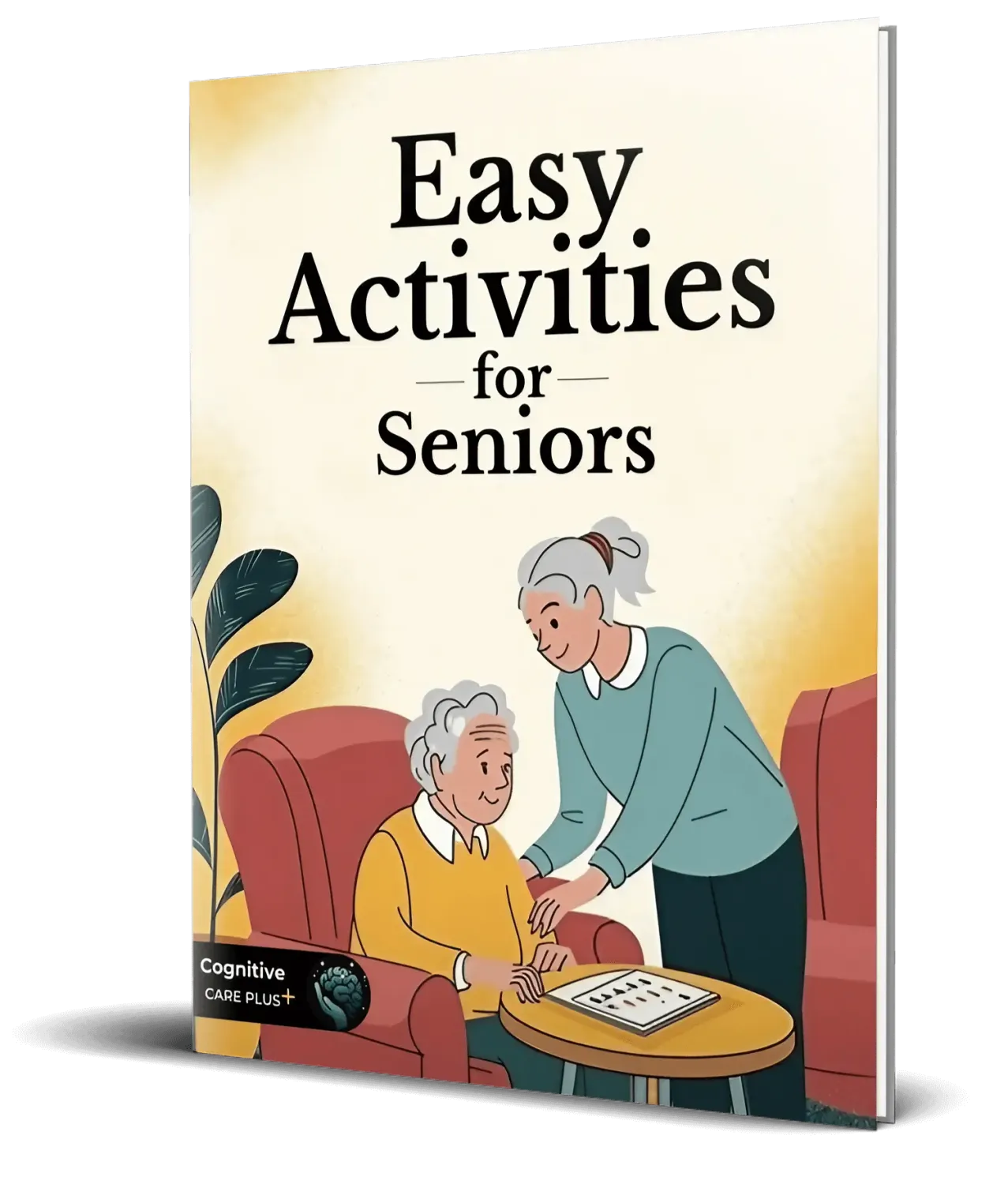Late Stage Dementia Care: What Families Need to Know
🫂When dementia progresses, how can you keep showing love while handling the hard days?
I know how heavy it feels to watch someone you love reach the late stage of dementia. The changes can be fast, leaving you unsure how to connect or what to expect next. Yet, even in these moments, your care matters deeply.
Let’s walk through what happens in late-stage dementia and how you can provide comfort while taking care of yourself, too.
🎧 Prefer to listen? Play our podcast episode below to learn how to bring comfort, dignity, and connection during late-stage dementia, even when words fade away.
✨ Enjoyed the episode?
Subscribe to the Cognitive Care Plus Podcast for practical guides, expert insights, and compassionate support to help you care for your loved one with dementia.
What Is Late Stage Dementia?
Late-stage dementia, sometimes called advanced or severe dementia, is when the brain damage has progressed significantly, affecting almost every area of life. Your loved one may:
Lose the ability to speak or recognize family and friends
Need help with eating, toileting, and moving
Sleep more often or seem disconnected
Have difficulty swallowing or holding up their head
It’s important to remember: they are still there, and your presence still brings comfort.
What Care Looks Like in Late Stage Dementia
Providing care during this stage focuses on comfort, safety, and dignity. Here are key areas you will manage:
1️⃣ Personal Care and Hygiene
You will need to help with bathing, toileting, and changing positions to prevent bedsores. Using gentle touch, warm water, and explaining each step can reduce fear.
2️⃣ Nutrition and Hydration
Difficulty swallowing is common, increasing the risk of choking. Working with a healthcare provider to find appropriate food textures (pureed foods, thickened liquids) is essential.
3️⃣ Pain Management and Comfort
Your loved one may not express pain verbally, but watch for facial expressions, moaning, or restlessness. Keep their environment calm, and ask their doctor about comfort measures.
4️⃣ Emotional Connection
Even if they can’t respond, talk to them, play soft music they love, and hold their hand. Familiar voices and gentle presence can ease anxiety.
If you’d like a more in-depth look at what daily care involves during this stage, this guide from the Alzheimer's Association offers a detailed overview. It includes practical tips for handling mobility, nutrition, communication, and end-of-life decisions with dignity and compassion.
How to Handle the Emotional Challenges
You may feel grief, frustration, guilt, or even numbness. These feelings are normal.
✨ Remember:
Take breaks. You deserve rest.
Join a support group (online or in-person).
Seek help from hospice or palliative care if needed.
Talk to a counselor if the emotional weight feels too heavy.
You’re not alone in this journey.
When Is It Time for Hospice?
Hospice care can provide comfort-focused support in late-stage dementia when your loved one:
Is unable to walk, speak, or perform self-care
Has difficulty eating or severe weight loss
Experiences frequent infections
To better understand this point, hospice nurse Julie explains in this brief video some key aspects of how death occurs in people with advanced dementia and offers valuable advice for caregivers:
Hospice teams offer medical, emotional, and spiritual support for the patient and family, often at home, helping you provide compassionate care while honoring your loved one’s dignity.
If you’d like to explore more about what to expect during the final stages of dementia and how to prepare emotionally and practically, this guide from Dementia Australia offers compassionate insights tailored for families and caregivers.
Not sure if it's time for more support?
If you're feeling overwhelmed or wondering whether your loved one needs extra help, this gentle guide can offer clarity and next steps.
🩵 Want more free tools to make caregiving smoother? Join our list and get practical resources delivered to your inbox.
Key Takeaways for Families
Your presence matters, even when words are gone.
Focus on comfort, gentle care, and emotional connection.
Seek help when you need it.
Take care of yourself; you cannot pour from an empty cup.
You can also explore these useful products: Therapy Dolls and Realistic Stuffed Animals for Seniors with Dementia
FAQ
Expect increased sleeping, reduced communication, difficulty swallowing, and complete dependency for care. Comfort becomes the focus.
Yes, they can, even if they cannot express it clearly. Watch for signs of discomfort and consult their doctor.
Yes, hospice can help manage comfort and provide family support during the final months of life.
Final Thoughts
Caring for a loved one in late-stage dementia is an act of love that comes with challenges and tender moments. Each small act of care brings them comfort. Remember, you’re not alone in this, and your care makes a difference.
🌿Want to keep learning? Visit our full collection of tools and products designed to support late-stage dementia care.
Share this article:
If this article helped you, share it with other caregivers who need encouragement.
💬 We’d love to hear from you!
Have you found a daily routine or specific activity that helps your loved one in the late stage of dementia feel more comfortable or engaged? What has worked best for you, and what challenges have you faced along the way? Share your experience in the comments—your insights might offer comfort or inspiration to another caregiver walking a similar path.

Trending
Simple tools that make caregiving...
Turning simple play into a brain-boosting activity...
Here’s what to look for when choosing...

About me

Hi there 👋 My name is George Cassou, I'm a psychologist and the creator of this blog. Inspired by my journey caring for my mom with Alzheimer's, I share activities and tips to bring joy and connection.

Affiliate Disclosure:
This website contains affiliate links. If you click on these links and make a purchase, we may earn a small commission at no additional cost to you. These commissions help us keep this site running and allow us to continue creating helpful content to support caregivers and families.





